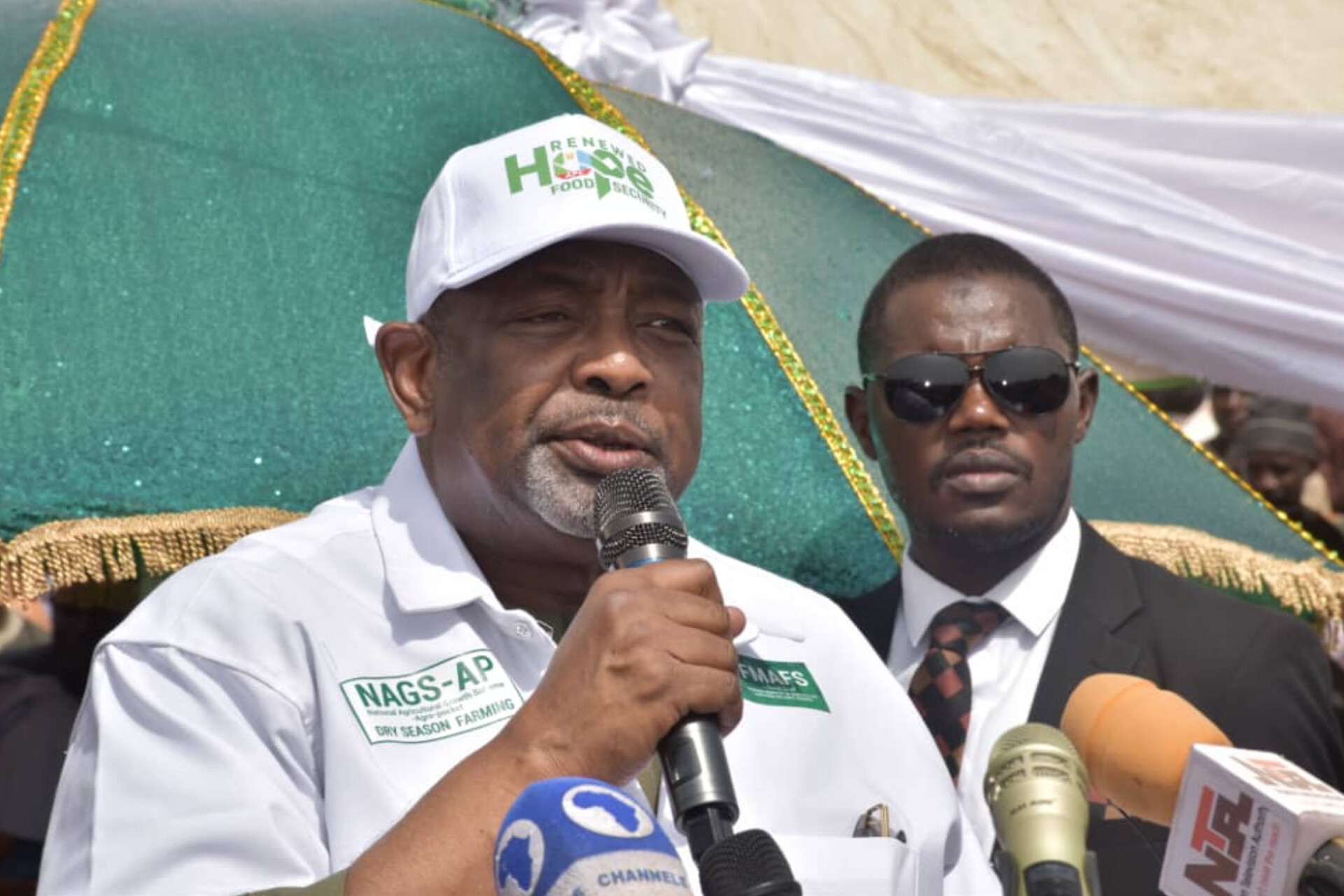By Ahmed Rufa’i, Dutse
In its effort to curtail overdependence on importation of Wheat from foreign countries, the federal government has projected to add over 1.2 million metric tonnes to the national food reserve at the end of 2023/2024 dry season wheat farming.
Minister For Agriculture and Food Security, Senator Abubakar Kyari made the disclosure on Saturday while flagging off the 2023/2024 national Wheat productions policy at Kadume village of Hadejia local government, Jigawa state.

He indicated that over 100,000 hectres would be cultivated this year to limit the country’s dependence on importation of the product.

Senator Abubakar Kyari said over 250, 000 farmers are to benefit from the federal government support to achieve production of over 1,250,000 metric tones across the nation.
The minister explained that, the flagging off of the program is a key activity in the implementation of federal government food security policy.
He noted that 100,000 hectres are targeted under the 2023/2024 national dry season Wheat productions policy, and a special package for 50 percent subsidy was designed for the registered farmers and their cluster.
“The registered farmers will be given free seeds while other inputs will be sold to them at 50 percent subsidy, aims at enhancing their capabilities to implement the program.
“Under the Federal Government policy we want improve our crops yields by 20 percent this year, with Wheat outputs targeted at 400,000, to 500,000 tones. Equally we will gradually continue to improve our irrigation facilities to diversify crops production for achieving food security, Jobs creation, growth and development “.
The Minister commended the commitments demonstrated by Jigawa state government and it’s farmers which proved to federal government that the state is a key and a reliable partner in achieving federal government food security policy, jobs creation and poverty eradication.
In his speech the JIgawa State governor, Malam Umar Namadi has called on the federal government to accelerate the completion of the Hadejia Valley Irrigation Project with potential irrigable area of over 25,000 hectares.
The governor said the area has the capacity to significantly deliver the Food Security objective of President Tinubu’s Renewed Hope Agenda.
Malam Umar Namadi explained that the Hadejia Valley Project, which was initiated by the Late Shagari Administration in the early 1980s, is still less than 25% completed after almost four decades.
According to him “Following a flag-off of the project performed in 2018, it is noteworthy that earlier this year, former President Muhammad Buhari has commissioned the successful completion of a segment of the Project covering about 6,000 hectares”.
The governor maintained that “There is no doubt that has significantly contributed to our quest for food security, job creation, and economic diversification. Despite this significant stride, however, there is still a long way to go considering the Project’s potentials. It is my prayer that the Tinubu Administration will make history by completing the project 100%.”
The governor note that the elaborate flag-off event as blessed by the presence of all these dignitaries underscores the priority attached to the Program which is critical to the attainment of State’s and National Development objectives of food security, economic diversification, and empowerment of the citizens.
He added that as many of us are aware, the Wheat Development Program an integral part of the Renewed Hope Agenda of President Bola Ahmed Tinubu aimed at accelerating the Nation’s drive to achieve food security.
It also perfectly aligns with several aspects of our 12-Point Agenda for Greater Jigawa particularly as it affects food security, economic diversification, job creation, provision of sustainable means of livelihoods for the citizens, and overall poverty reduction.
Accordingly, both the Federal Government and the Government of Jigawa State have accorded a topmost priority to the Program for which all hands would be on deck to ensure its success.
“Over the years, Jigawa State has successfully pursued an Agricultural Transformation Agenda which has significantly contributed to our Nation’s quest for food security and economic diversification”.
Malam Namadi stated further that, “Today, Jigawa State is a leading producer of rice, sesame, and hibiscus among many other crops. One of the resolutions under our 12-Point Agenda is to ensure full exploitation of the Jigawa State’s agricultural potentials through all-year round production by bringing more of our fadama lands under cultivation, gradual expansion of our irrigation facilities, and mobilizing our teeming youths into Agriculture and its entire value chain”.
He emphasized that the Wheat development programme partnership with the Federal Government is in line with state the government’s resolve to sustain progress and build on previous achievements of the agricultural transformation agenda. “It is in line with our objective to sustainably improve the socioeconomic well-being of our citizens.”
“I am also truly delighted by the choice of Jigawa State as the primary focal State for the Wheat Development Program. It is common knowledge that Jigawa State is the heart of wheat production in Nigeria with potential to provide up to 200,000 hectares for wheat production. “




